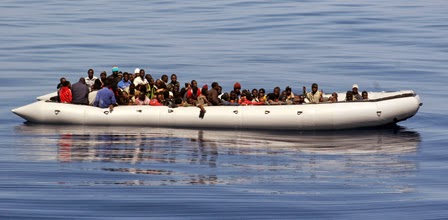Mediterranean migrants: the European closure
Interview with Valerio Landri, director of the diocesan charity community in Agrigento
 |
| Photo Credit: Noborder Network https://www.flickr.com/photos/noborder/ https://creativecommons.org/licenses/by/2.0/legalcode |
These people leave from the North Africa for a desperate travel, in search of peace, far away from their original countries.
Europe tries to manage once again the problem by
starting a new sea control operation, Triton.
However, there are still some difficulties and the
people in the territory first reached by the crossers know them.
Italy is the most involved country because of its position in front of the North Africa coasts. In particular, the South part has to manage with the thousands of migrants who reach their lands every year.
Italy is the most involved country because of its position in front of the North Africa coasts. In particular, the South part has to manage with the thousands of migrants who reach their lands every year.
Valerio Landri is the director of the diocesancharity community in Agrigento, a city on the west of Sicily, near the island
of Lampedusa. He has told me, through a phone interview, the consequences of
the decisions made from the top in their daily help towards the migrants.
How difficult is to integrate the immigrants,
especially those who arrive illegally in Italy?
The migrants generally just pass over our island. Consequently
there aren’t the conditions to work on a real integrative process.
Here they stop just for the first period. Afterwards, they go elsewhere, especially the Eritrean and the Syrian people.
Here they stop just for the first period. Afterwards, they go elsewhere, especially the Eritrean and the Syrian people.
However, as soon as they reach our coasts, we provide
them anything that is essential.
Our mission is mostly aimed to a cultural mediation: we try to make them understand the context, the Italian laws; we try to orientate them towards the choices they have to make.
Our mission is mostly aimed to a cultural mediation: we try to make them understand the context, the Italian laws; we try to orientate them towards the choices they have to make.
From the
first November, the operation Mare Nostrum has been stopped. Instead, Triton,
which is mostly a control operation, has been started.
How do you consider this decision by the European state members?
How do you consider this decision by the European state members?
 |
| Lampedusa Photo Credit: Noborder Nertwork https://www.flickr.com/photos/noborder/ https://creativecommons.org/licenses/by/2.0/legalcode |
The Dublin Regulation says that the migrant’s care
is a duty of the country where the migrant first arrive, and that Regulation
appears untouchable.
Mare Nostrum seemed to realize those humanitarian
corridors that the Europe refused. When our Minister of the Interior, Alfano, first
presented it, the Europe appeared disposed to take the responsibility of the
migrants in the Mediterranean.
The Europe do not accept the logic of the sea
rescues, hence the logic of the humanitarian operation with the aim of rescuing
the hundreds, thousands of migrants that in any case will leave from the Libyan
coast.
They will leave anyway because they are ready to leave, because they have yet bought a ticket and, above all, because they do not have the choice to stop in Libya for they are escaping persecutions, wars, and absolutely inhuman life conditions.
They will leave anyway because they are ready to leave, because they have yet bought a ticket and, above all, because they do not have the choice to stop in Libya for they are escaping persecutions, wars, and absolutely inhuman life conditions.
Now we will approach the migrants just by
controlling them.
It is the core of the operation that is different: it is no more an operation which aims to the safeguard, to the health of the migrants. Its focus is only on the borders’ control.
It is the core of the operation that is different: it is no more an operation which aims to the safeguard, to the health of the migrants. Its focus is only on the borders’ control.
Triton has confirmed once more the European evident
closure towards the immigrants.
It refuses to understand that over the sea something is happening, it keeps on without concerns for the African problems.
Nevertheless, we know that a great part of the African and the Middle East problems come from our Foreign policy.
It refuses to understand that over the sea something is happening, it keeps on without concerns for the African problems.
Nevertheless, we know that a great part of the African and the Middle East problems come from our Foreign policy.
How hard will your job become after such a
decision?
I can only imagine that the arrivals to Lampedusa or
directly toward the Sicilian coasts will restart.
Additionally, there has been a meeting in the
prefecture of Agrigento yesterday, where it has been explained a health
protocol for the welcome of migrants.
The idea now is that a migrant means infector, he is synonym of possible Ebola.
This suspect of disease won’t obviously ease their acceptance by the people.
The idea now is that a migrant means infector, he is synonym of possible Ebola.
This suspect of disease won’t obviously ease their acceptance by the people.
I fear many people will die in the sea.
The people have already bought a ticket for those boats built in Libya and calibrated for arriving just few miles away the Lybian coast. They are convinced that Mare Nostrum would rescue them.
Those tickets remain sold.
The people have already bought a ticket for those boats built in Libya and calibrated for arriving just few miles away the Lybian coast. They are convinced that Mare Nostrum would rescue them.
Those tickets remain sold.
We will cry again the dead in the sea, but we knew
what was going to happen.
As the tools to manage the arrivals will miss, the
situation in the South of Italy will become more and more difficult to sustain.
Comments
Post a Comment